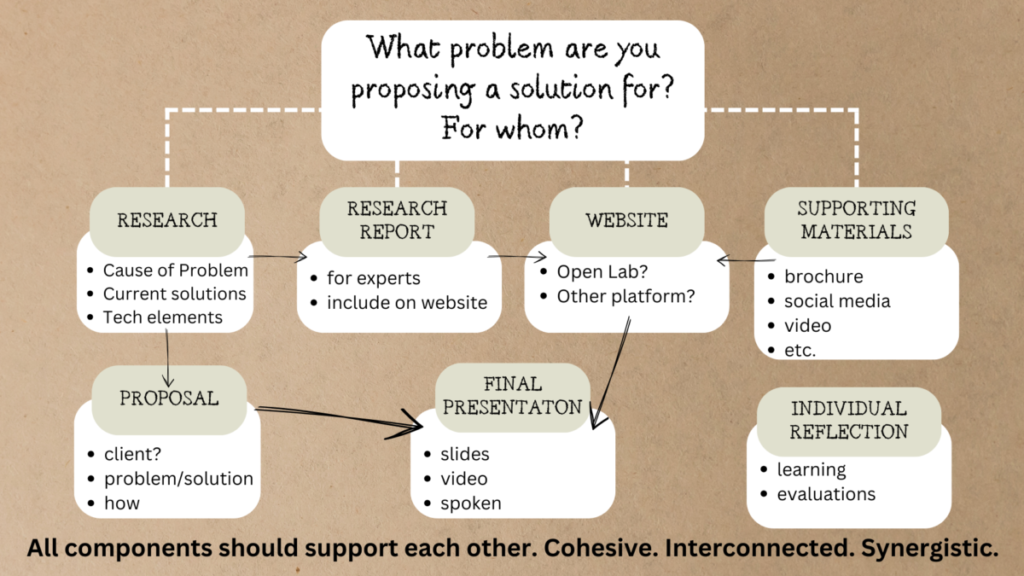Much of the work you’ll be doing on the job will be collaborative. And as much as many of us have had problems doing team projects, it’s still an important skill to address.
What are you working on… exactly?
You’ll be part of a small team that will complete a service learning based project that addresses a real-word need that your team identifies and then proposes a research-supported solution.
What does that mean, exactly? It means you’ll identify a problem in a specific community, collect data about the problem (including why it happened, what’s been done so far, what has and hasn’t worked, etc), and then propose a science or technology based solution for that problem.
To accomplish this, your team will:
- write a proposal for a non- or low-tech audience that has a stake in solving the problem,
- draft a research report about the problem and solutions,
- create supporting materials that address the argument of your proposal including a website and any one of the following: brochure, social media campaign, video, or anything else you think might work in that context and for that audience (I’ll need to sign off on that),
- create and deliver a 10-minute proposal presentation for your audience
Individually, you will write a reflective summary report due the last day of class once the presentation is completed and the deliverables are finalized. In this report, you’ll write about what happened with the project, what you learned, what you learned about yourself, what worked, and what didn’t and why. You’ll attach an evaluation sheet where you’ll evaluate yourself and your team members. This will sent in a private email to me.
You can set up your team workflow in whatever way works best for the members. What I mean by that is that you don’t have to rely on class meetings to confer with each other. You can obviously use the class, but you can also set up a Discord channel or have me create a Slack channel on our class workspace. You can create a Google Drive folder, use Google Docs, or anything else that you think might work.
Each week we’ll have assigned readings for several weeks, and we’ll begin each class with a 7-minute freewrite about what you got from the reading as well as how you’re doing in general with the team and the project. These will be in private blog posts here on OpenLab. Once we’ve completed the readings, the daily in-class blog posts will be a progress report on the project.
This is obviously a lot of work, but you have the rest of the term to complete it. The keys to success are cooperation, collaboration, planning, and delegation. I’ll also show you some tools you can use, including how to build a project website on OpenLab, but absolutely feel free to bring in your individual expertise on any part of the project.
Flow chart of the project

All of the forms you’ll need (Individual Assessment Worksheet, Team Charter, Team Evaluation) are in the Google Drive folder labeled Team Projects.
Deliverables, Assignments, Due Dates
- Monday 10/30: Fill out individual worksheets, brainstorm ideas for projects, initial team selection.
- homework: In Perusall, read and annotate Chapter 17 (p.305) in the required textbook on Group Communication
- Wednesday 11/1: In-class blog response to reading. Initial team meetings. Group charters. Set up work flow and assignments.
- homework: In Perusall, read and annotate Chapter 19 (p.337) in the textbook on Managing Projects.
- Team leader post team charter in Google Drive folder labeled Team Projects
- Monday 11/6: In-class Perusall General Discussion response to reading. Discuss reading. Discuss charters. Team meetings.
- homework: In Perusall, read and annotate Chapter 23 (p.384) in the textbook on Proposals.
- Wednesday 11/8: In-class Perusall General Discussion response to reading. Discuss reading. Team meetings.
- homework: In Perusall, read and annotate Chapter 24 (p.403) in the textbook on Research Reports.
- Monday 11/13: In-class Perusall General Discussion response to reading. Discuss reading. Team meetings.
- homework: In Perusall, read and annotate Chapter 20 (p.350) in the textbook on Websites.
- Wednesday 11/15: In-class Perusall General Discussion response to reading. Discuss reading. Team meetings.
- homework:
- In Perusall, read and annotate Chapter 25 (p.428) in the textbook on Feasibility Studies.
- Proposal due 11/20 EOD
- homework:
- Monday 11/20: In-class Perusall General Discussion response to reading. Discuss reading. Death by PowerPoint. Team meetings.
- homework: In Perusall, read and annotate Chapter 18 (p.319) in the textbook on Oral Presentations.
- Wednesday 11/22: No class – Thanksgiving break
- Monday 11/27: In-class Perusall General Discussion response to reading. Discuss reading. Team meetings.
- homework: In Perusall, read and annotate Chapter 26 (p.449) in the textbook on Progress Reports.
- Wednesday 11/29: In-class Perusall General Discussion response to reading. Discuss reading. Team meetings.
- Monday 12/4: In-class blog progress report. Team meetings/studio time.
- Wednesday 12/6: In-class blog progress report. Team meetings/studio time.
- Monday 12/11: In-class blog progress report. Team meetings/studio time.
- homework: Presentations (including website and supporting materials) due Monday 12/18.
- homework: Individual Reflection email including Team Assessment due Wednesday, 12/20.
- Wednesday 12/13: NO CLASS – CUNY reading day.
- Monday 12/18: Begin presentations.
- homework: Website including presentation and supporting materials due 12/20.
- homework: Individual Reflection Reports and Team Assessments due 12/20.
- Wednesday 12/20: Finish presentations. Final wrap-up.
Some helpful info and links —
Sample apa research report paper: This is on the Purdue OWL site.
Creating a Project Site in OpenLab (from the OpenLab Help Center):
Links to other students’ project sites (some of these are simple technical reports, and there’s more than one template that students used – you can choose):
Elements of Proposals




